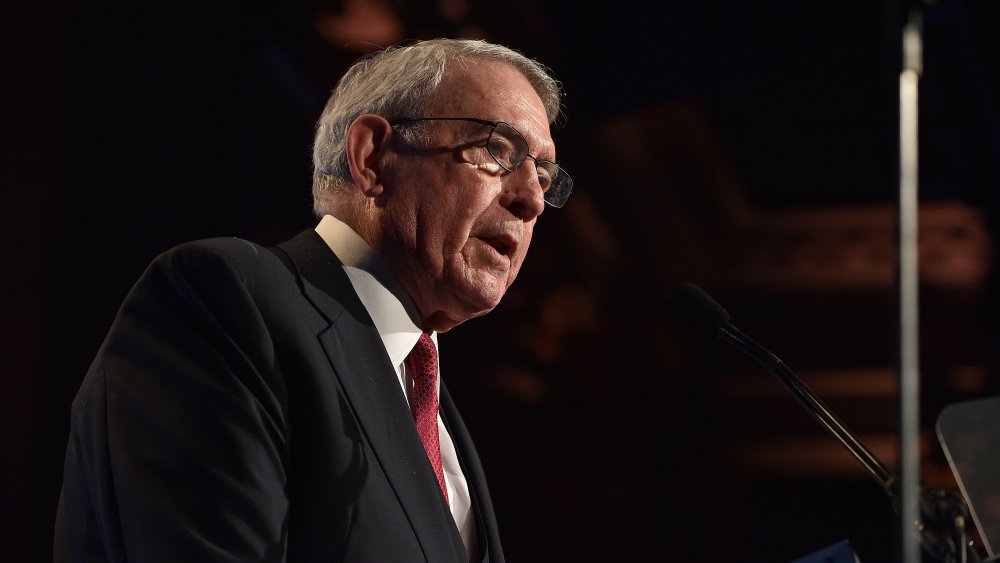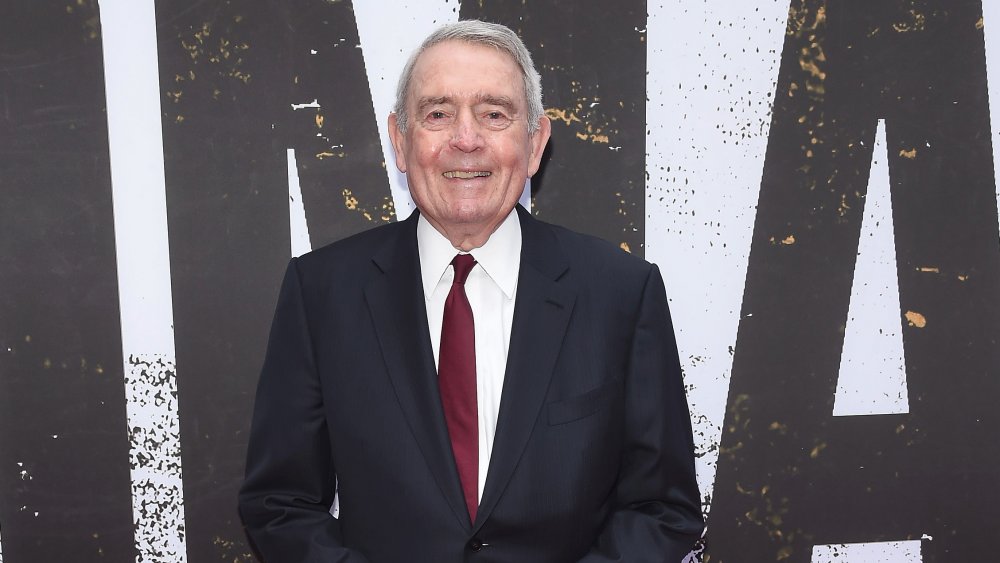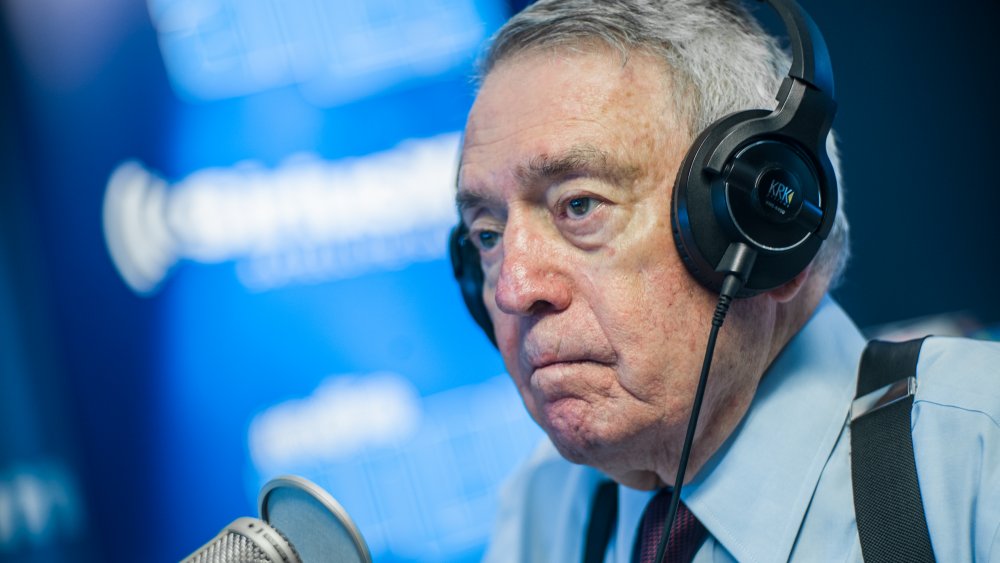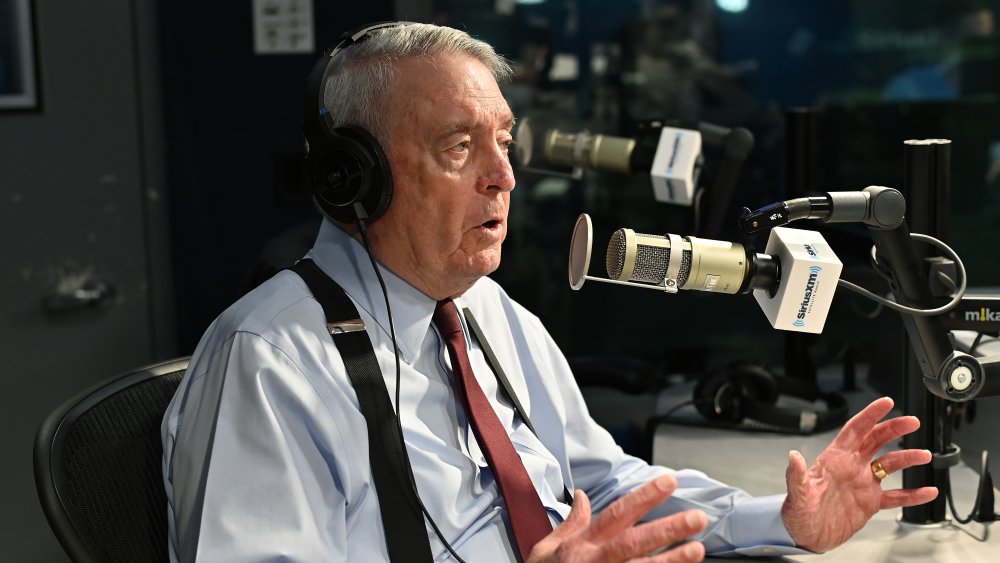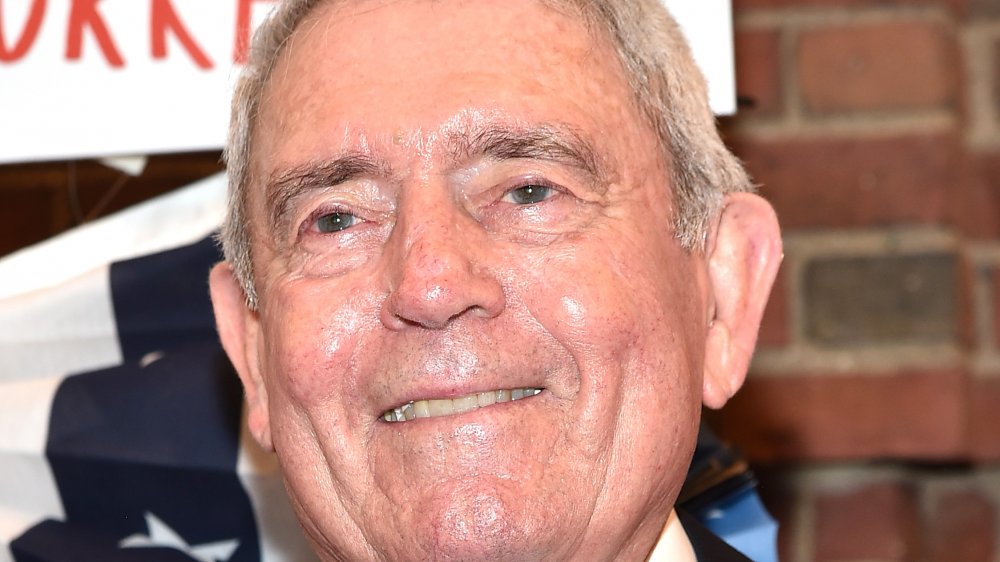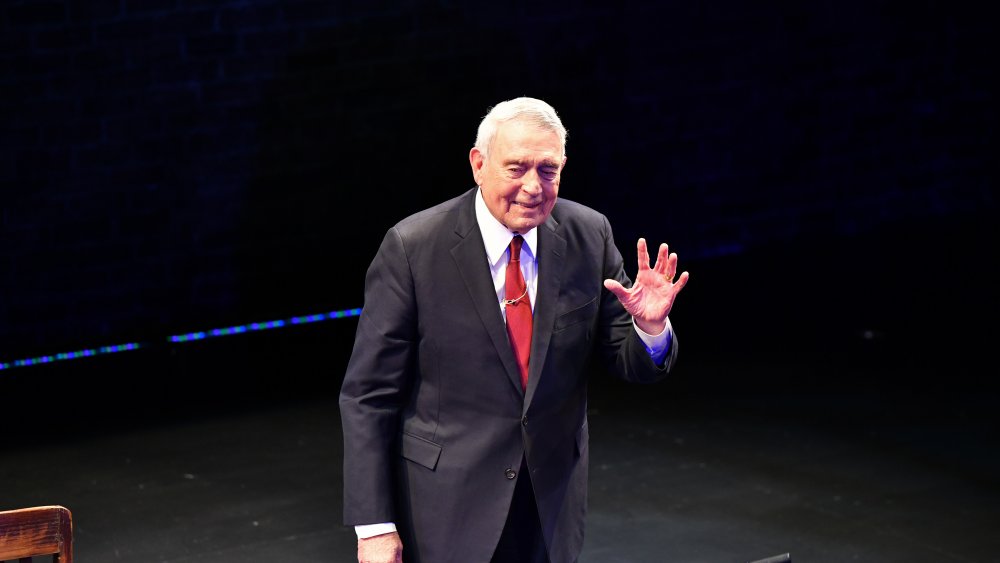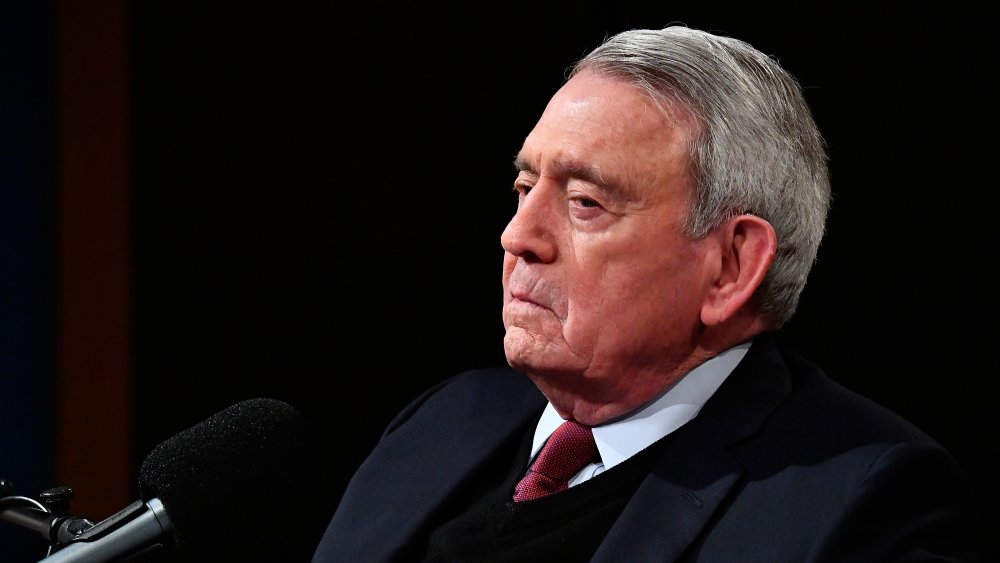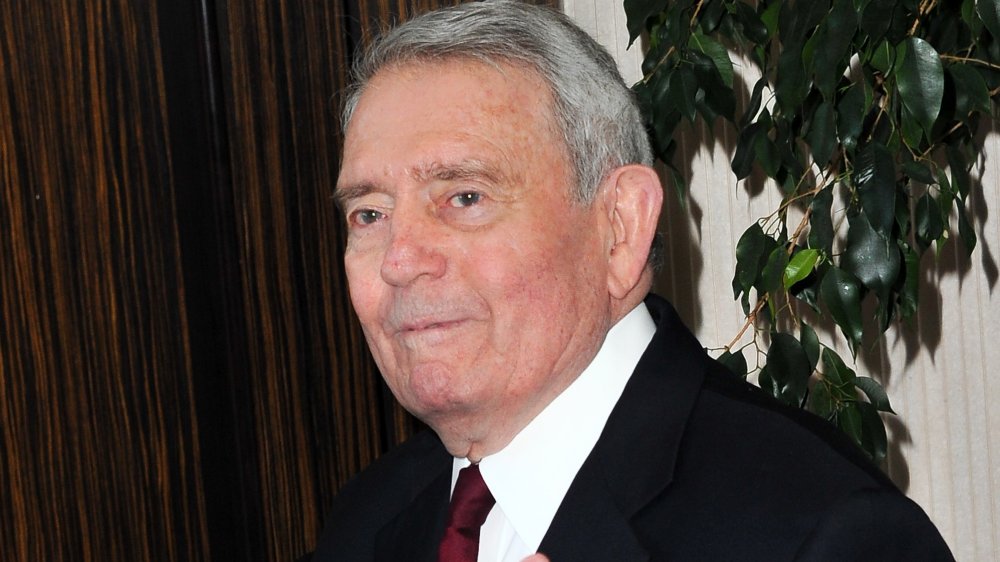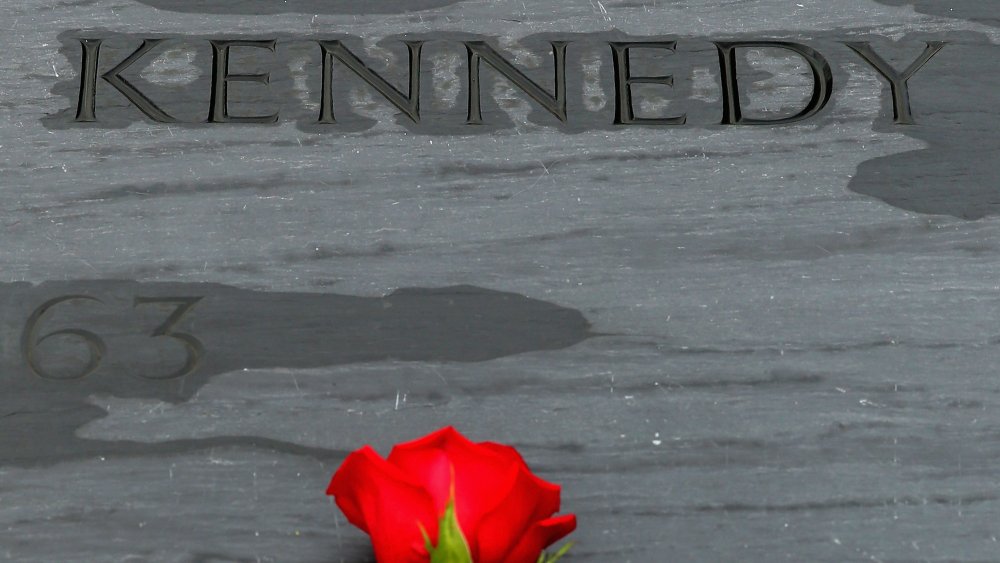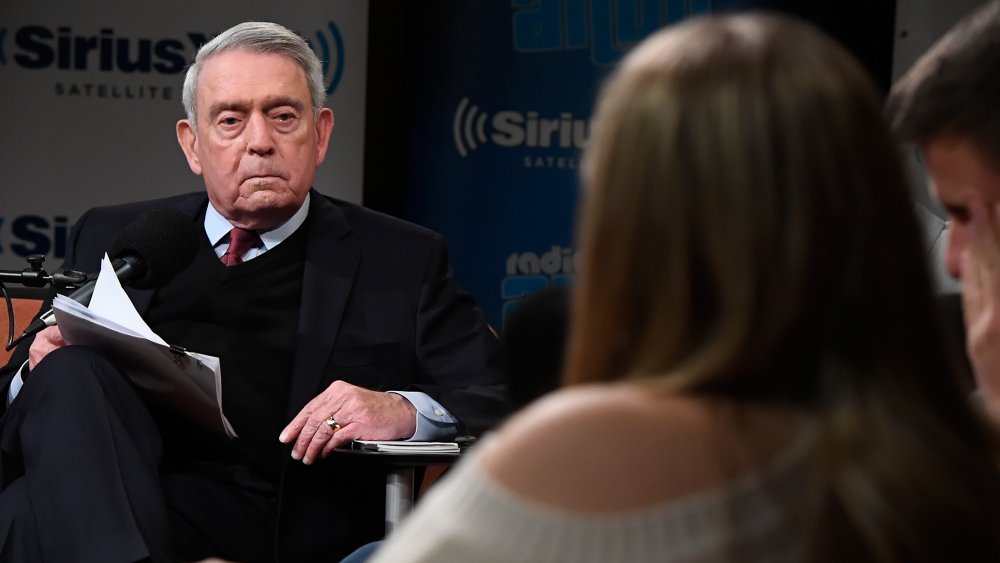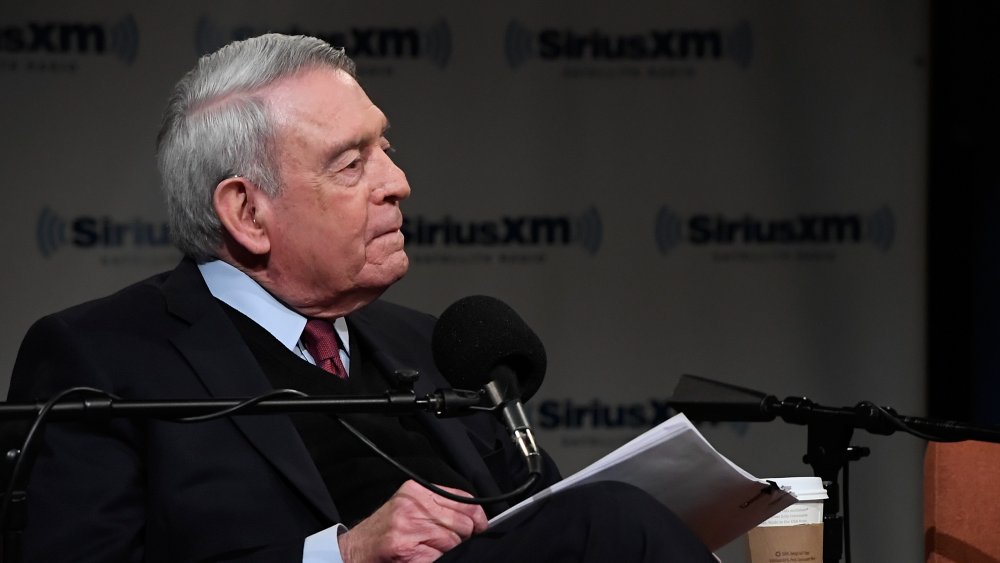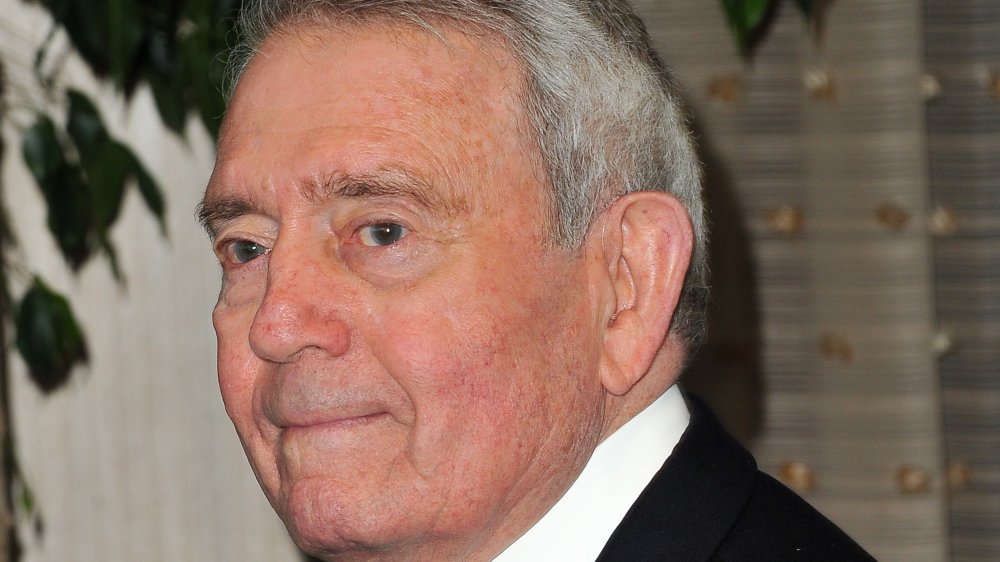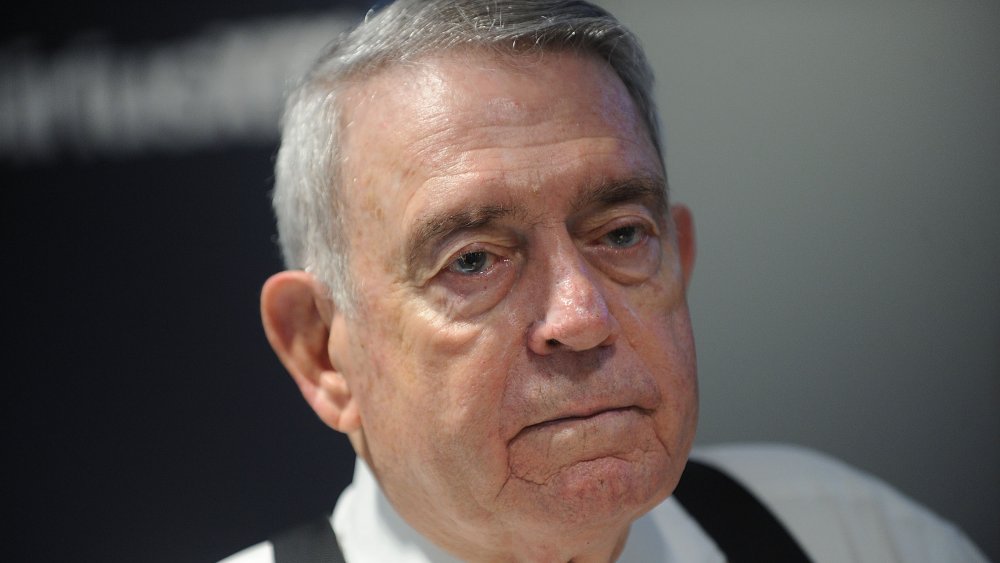The Untold Truth Of Dan Rather
Journalist Dan Rather has been around in the industry for a long time. The 2015 film "Truth" highlighted what Rather and his colleagues went through when they aired a controversial news report in 2004 about then-President George W. Bush's past military service — a report which ultimately cost Rather his job. According to The Guardian, Rather is an intense man who is ambitious and clear about his goals. He's also not necessarily liked.
In his long career, Rather has won an impressive number of honors, such as 33 News and Documentary Emmy Awards (via CNN). He's also well-known for dropping folksy metaphors in his news reports, and he isn't afraid to take risks, to say the least. For example, he once worked from Afghanistan and wore traditional local clothes for his segment, a move that drew derision from other news anchors.
Here's a look at some of the most interesting aspects of Dan Rather's journey, including his early years, his struggle to break into the news industry, his longstanding career as an anchor, his time with CBS, and more.
He learned to value hard work early
Daniel Irvin Rather Jr. was born on October 31, 1931, in Wharton, Texas, to Daniel Irvin Rather Sr. and Bryl Rather. His father was a man who was dedicated to his work. As Dan wrote in his memoir, "I Remember," his dad was always working, even during the Great Depression, which was no easy feat. His work as an oil pipeliner required him to be physically strong and comfortable dealing with challenges. Dan wrote that he greatly admired his father's work ethic and considered him his hero as a kid.
"... My most enduring childhood memory of him is seeing him in the ditch, digging, drenched in sweat — sweating as if water was pouring off him — when he first took me along to his job, riding in the 'bear trap,'" Dan reflected. He was around 5 or 6 when that happened, and showing Dan Jr. his place of work was Dan Sr.'s way of bonding with his young son.
He was intrigued by journalism as a child
Dan Rather was fascinated by journalism even as a child. According to the Briscoe Center for American History, his father was a factor here, as well. When he wasn't at work, he was a voracious reader, an aspect that influenced his son. The turning point was when Rather suffered from a bout of rheumatic fever as a child and was left bedridden for a good chunk of the next three years, per Biography. During this period, he took to listening to radio broadcasts from war journalists.
That said, it was difficult for the budding journalist to stay in bed and not venture outside. Rather wrote in his memoir that it was a frustrating experience for him. He found ways to keep himself busy, reading and turning to the radio often when nothing else helped. He also vowed that he'd take it easy in a bid to try and get well as soon as he could.
He worked hard before getting into the field
Dan Rather was not afraid of diving in and working like nothing else mattered once he'd decided to be a journalist. As per Biography, Rather chose to pursue journalism seriously when he was a teenager. After finishing high school in 1950, he entered Sam Houston State Teachers College in Huntsville, Texas, where he edited the school's paper and also held down reporting gigs for the Associated Press, KSAM Radio, and United Press International.
According to the Briscoe Center, Rather wrote almost 100 stories for The Houstonian, his school's newspaper, and used his gig with KSAM to get familiar with the basics of journalism. Rather was a jack of all trades: He wrote, covered local sports events, and perfected his skill at ad-libbing. He was determined to get it right and left no stone unturned in the process. This experience proved to be incredibly useful for Rather when he got into reporting full-time. He earned his undergraduate degree in journalism from Sam Houston College in 1953.
Dan Rather briefly joined the Marines
Dan Rather had a brief stint with the United States Marine Corps. According to 27East, Rather's time with the Marines was extremely short, a fact that he isn't fond of talking about but isn't afraid to own up to nevertheless. When he joined the Marines, he didn't tell them about his childhood bout with rheumatic fever, and once the Marines found out, Rather was discharged.
"I told them I didn't have any disqualifying diseases. I'm not proud of it," he said. "I had one of the shortest and least-distinguished records in the whole history of the United States Marine Corps because they found out." Rather acknowledged that because he didn't spend a lot of time in the Marines, he simply never had much time to contribute anything to the Corps. He added that, at most, he could just say that he volunteered to be a part of it, and that was all. He was 22 at the time.
His first job taught him to be versatile
According to the Briscoe Center for American History, Dan Rather's first full-time reporting job was with The Houston Chronicle. He accepted every assignment he could possibly work on — Rather would helm broadcasts, write news reports, and cover the police, City Hall, and the courts as a beat reporter.
Rather was taking on as much work as he could get away with at that stage in his career in a bid to break into the reporting industry. As described by Biography, the journalist was in his comfort zone when working with the Chronicle's radio station, KTRH. He fought his way up the ladder quickly, and in 1956, he was promoted to news director at KTRH, a definite feather in his cap.
Rather didn't stop covering sports during his time with the Chronicle, either, which eventually helped him get a job with TV station KTRK-Houston in 1959, for which he delivered a weekly TV broadcast at the University of Houston.
His work paid off
All of Dan Rather's hard work was certainly not in vain. His success, and income, grew. He acknowledged in "I Remember" that he wasn't used to being so financially well-off. He wrote about how his family simply wasn't accustomed to so much money: His father was never paid more than $12,000 each year, and Rather genuinely thought he'd be hard-pressed to make anything beyond $10,000 a year. He wrote about how unbelievable for him to break that barrier and bring home $10,800 in 1959 (by virtue of working three jobs).
Rather's accomplishments made his father very proud of his son, and he told him as much. "Dan, you're in a different league now, a whole different world," he said. "It's a world I don't know or understand. But gawdalmighty, boy, I think you'll make $25,000, maybe $35,000 a year before you're through! And I'll tell you something else, son: This is an important job, important work."
Rather had earned his father's respect.
His reporting during Hurricane Carla saved lives
In September 1961, Dan Rather was responsible for covering Hurricane Carla and saving numerous lives. As explained by The Atlantic, radar images in television news didn't exist back then, and members of the public wouldn't generally know how severe a storm would be until it hit. When Carla was on its way to Texas, people weren't leaving, even though they'd been told to evacuate by the US Weather Bureau.
Rather, who was 29 then, felt like the hurricane could be a major event and teamed up with a camera crew to report from the Weather Bureau's office and show just how massive the storm was with the help of its radar console. Rather's innovative tactic is credited with transforming how the world looks at hurricanes. Plus, Rather didn't hesitate to report from the field when the hurricane hit, putting himself in a dangerous situation to cover the story. The hurricane is stated to be the ninth most powerful storm to have hit the country since 1851.
Thanks to Rather's quick thinking and clever reporting, as many as 350,000 people decided to evacuate their homes. A major tragedy was thus averted. Rather's work covering Hurricane Carla got him a job with CBS News, which he joined the next year.
Dan Rather was one of the first reporters to cover JFK's assassination
On November 22, 1963, Dan Rather was one of the first journalists on the scene when President John F. Kennedy was shot. Years later, when the journalist was asked about what he was feeling at that point, he revealed that he didn't have a chance to feel anything, as he focused on getting his work done. "I had a job to do," he said on "The Kalb Report" (via GW Today). "There were no emotions — forget about emotions. You had to keep focused."
Rather wasn't sure what happened, but he saw the president's limousine momentarily. A conversation with his colleagues at CBS made him realize that the president had been shot and was being attended to at a nearby hospital. While the official confirmation hadn't arrived, Rather decided to trust his gut and declared that Kennedy had passed away. On the conspiracy theories surrounding the attack, Rather mentioned that he didn't believe them and that they weren't convincing enough as far as he was concerned before adding, "Everyone is entitled to their own opinions, but we're not entitled to our own facts."
Rather also pointed out that his coverage of Kennedy's death was similar to 9/11, calling both events the "bookends" of the era when television news was crucial. This, according to Rather, has changed drastically with the rise of social media because it's tricky to be sure about credentials.
He served as a White House correspondent
As reported by CNN, Dan Rather was appointed as the White House correspondent for CBS News in 1964. He briefly left, serving as the bureau chief of the studio's London and then Saigon branches before going back to his role as White House correspondent in 1966. He retained the position for many years, only leaving in 1974.
Rather wrote in "I Remember" that as a child, he wasn't aware of the role reporters played when it came to presenting news stories on politics and the White House, going to meet the politicians, including the president, in person. "One morning, when I was eleven, I learned what most reporters actually do and got my first look at a species of the breed to which I aspired," he wrote, referring to an event that, for him, was the equivalent of meeting the president at the White House. A boy had drowned, and a reporter showed up at the scene. Rather could not help but observe him carefully as he went about his work and gathered details of the disturbing event.
Years later, when Rather was working as a reporter and got the chance to cover politics, he focused on both the Johnson and Nixon administrations and was also active during the Watergate scandal. According to Rather, his mother wished in the 1960s that he would go easy on President Johnson and not be so critical.
He has been accused of being biased
Dan Rather has had his fair share of major controversies in his career. Some of his most vocal critics contend that he has failed to be objective while covering politics. As explained by The Baltimore Sun, Rather was no stranger to scandals and got into a lot of trouble compared to others in network television. "Bad things seem to happen around Dan Rather," Ed Fouhy, former executive vice president of CBS News, commented once. "He's a lightning rod." In fact, Rather was once attacked by security guards in 1968. As per CNN, this incident occurred when Rather tried to ask questions about a Georgia delegate being thrown out of the Democratic National Convention in Chicago.
Rather's influence in the news industry as the successor to celebrated journalist Walter Cronkite and his role as an anchor on the CBS Evening News as well as his work for 60 Minutes is undisputed, as explained by The Baltimore Sun. While covering the Watergate scandal, Rather didn't mince words as he threw questions at President Richard Nixon, who shot back at him with the question, "Are you running for something?" Rather simply said, "No, Mr. President. Are you?"
Rather's critics state that he obviously has a liberal bias. A former reporter for CBS, Bernard Goldberg, indicated that Rather's work was compromised because of his liberal stance, which inadvertently affected his news reports.
His exit from CBS was full of drama
Dan Rather's career took a massive hit when he had to leave CBS in the mid-2000s. According to The Hollywood Reporter, the report that got him into trouble was a deep dive into President George W. Bush's military activity from 1968 to 1973. The story, "For The Record," was broadcast on 60 Minutes two months before the president was re-elected in 2004 and relied on photocopied memos from Bush's squadron commander. Bush was accused of disregarding an order to show up for a physical in 1972, and it was hinted that he probably went AWOL from the Texas Air National Guard.
While the White House didn't comment on the issue at first, Bush did state that he'd never received any special treatment during his time in the Guard. The story did make quite a few people angry, though, especially right-wing groups, who accused Rather of a biased bid to malign the president's image. Things quickly escalated and got out of control: The producer of 60 Minutes, Mary Mapes, was let go, and she never got back into TV journalism. As for Rather, his credibility was heavily questioned, and in 2006, he decided to leave CBS, where he'd worked for 44 long years. He slapped his ex-employers with a $70 million lawsuit the next year.
According to CNN, Rather claimed in his suit that his former employers decided to make him a scapegoat when they came under fire for airing the controversial story.
Dan Rather's legacy as a broadcast journalist is undeniable
In his long career as a broadcast journalist, Dan Rather has managed to make a definite impact. It's undeniable that he has heavily contributed to the industry. Consider this: He pulled off a powerful report in 2004 on a pressing issue: the torture of prisoners at a jail in Baghdad, Iraq, described by The Hollywood Reporter as a "journalistic triumph," only six months before his explosive report on President George W. Bush.
Despite his age, Rather hasn't slowed down. As Vox reported in 2019, the journalist is still active in the industry and juggles several TV programs. He has stayed true to his passion and continued doing what he does best: diving into the most relevant and powerful stories of our time. When Rather was asked about his perspective on interviewing a powerful figure (like the president) and his advice for other journalists, he responded, "Anytime one interviews the president, it's a high honor. I always look at it that way. It's an honor, it's a challenge, and one always wants to be respectful. But you also want to ask direct questions. [...] The more powerful the person, the more likely it is that the person's going to try to do what I call the old political sidestep, the side shuffle." He added that it's essential to stay alert during such interviews and to keep asking and following up until you get the answer you're looking for.
